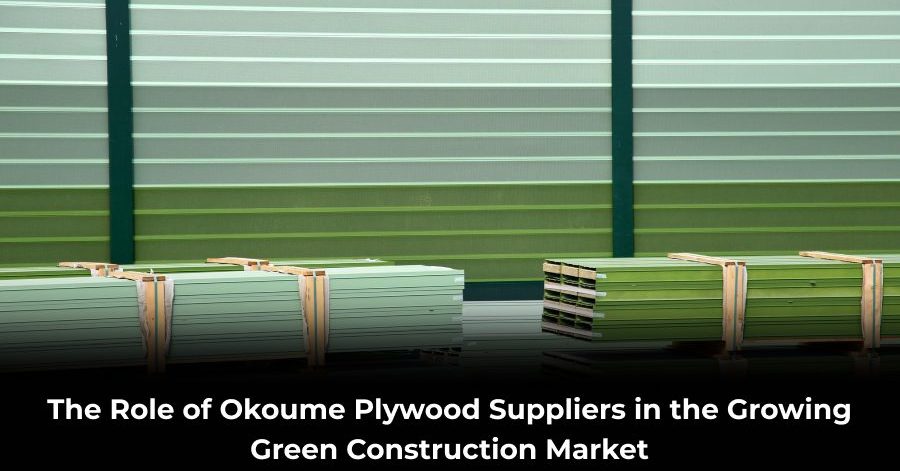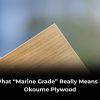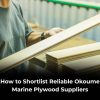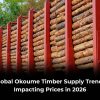The construction and manufacturing industries are undergoing a profound transformation. Driven by a growing awareness of environmental responsibility and a global push for sustainability, the “green building” movement has moved from a niche interest to a mainstream mandate. This shift transcends adding solar panels; it demands a fundamental re-evaluation of the materials we use, seeking options that are renewable, efficient, and ethically sourced. In this new paradigm, one material has emerged as a silent champion for a variety of demanding applications: Okoume plywood.
However, a material’s sustainability is only as robust as the supply chain behind it. The rising demand for eco-conscious building solutions has elevated Okoume plywood suppliers from simple vendors to essential partners in innovation. They are the critical bridge connecting responsibly managed African forests to the architects, boatbuilders, custom furniture makers, and discerning DIY enthusiasts who are building a more sustainable world. This deep dive explores how these suppliers are not just moving product but are actively enabling and accelerating the growth of the green construction market through expertise, ethics, and education.
Understanding the Star Player: What is Okoume?
To truly appreciate the supplier’s role, we must first understand the unique material they provide. Okoume (Aucoumea klaineana) is a deciduous hardwood native to the biodiverse rainforests of West-Central Africa, with Gabon being its primary source. For decades, its exceptional characteristics have made it a prized resource for those in the know.
- Unmatched Lightweight Strength: Perhaps its most celebrated feature is its incredible strength-to-weight ratio. Okoume timber is one of the lightest commercial hardwoods available. This translates to easier handling on-site, reduced physical strain for craftspeople, and significantly lower fuel consumption during transportation—a direct reduction in the carbon footprint from forest to workshop.
- Aesthetically Pleasing: Beyond its functional attributes, Okoume is a beautiful wood. It boasts a typically straight, fine grain with a uniform texture and a distinctive warm pinkish-to-salmon hue that deepens richly when a clear finish is applied. This makes it a superb choice for projects where the wood itself is meant to be seen and appreciated.
- Superior Workability: Builders and woodworkers consistently praise Okoume plywood for its cooperative nature. It machines cleanly with minimal splintering, sands to a silky-smooth surface, and holds screws and adhesives exceptionally well. This ease of use reduces waste from errors and makes it an ideal material for complex designs and curved structures, such as in boat hulls or architectural features.
When this versatile timber is skillfully laminated into panels using waterproof adhesives and high-quality veneers, it becomes Okoume marine plywood. This specific grade is engineered to withstand harsh, moist environments without delaminating or succumbing to fungal decay, making it the undisputed top choice for boatbuilding, exterior signage, and other applications exposed to the elements.
The Supplier’s Evolution: From Wood Merchant to Sustainability Partner
The role of a modern Okoume plywood supplier has dramatically evolved. They are no longer passive middlemen but active, knowledgeable facilitators of sustainable practice.
1. Guardians of Certification and Traceability:
In an era of greenwashing, verification is everything. The most critical function of a reputable supplier is to ensure the wood they sell is sourced from legally logged and sustainably managed forests. This means going the extra mile to partner with mills that hold certifications like the Forest Stewardship Council (FSC®) or Programme for the Endorsement of Forest Certification (PEFC). These certifications are not just stickers on a panel; they represent a verifiable Chain of Custody that tracks the Okoume plywood every step of the way, from the forest to the final customer. By investing in these systems, suppliers provide the assurance that their products support forest conservation, biodiversity, and the rights of local communities.
2. Educators and Technical Advisors:
There is a significant knowledge gap between a generic building material and a specialized product like Okoume. A distinguished woodworking supplies store fills this gap by acting as an educational resource. Their staff can explain the technical differences between standard and marine-grade plywood, advise on the appropriate thickness for a specific application, recommend compatible epoxies and finishes, and guide proper installation techniques. This knowledge transfer is invaluable; it ensures the material is used correctly, performs to its potential, and achieves the longevity that is a cornerstone of true sustainability.
3. Curators of Quality and Consistency:
The performance of any plywood depends heavily on the quality of its construction. A premium supplier meticulously curates their inventory, sourcing only from mills with a reputation for excellence. This means rejecting panels with core voids, loose knots, or uneven laminations. They ensure the face veneers are consistently smooth and free of defects, and that the waterproof adhesives are applied perfectly. For a naval architect or a high-end furniture maker, this guaranteed quality eliminates project risk and material waste, ensuring that every sheet of Okoume marine plywood delivers on its promise.
4. Reducing Waste Through Value-Added Services:
Sustainability is also about efficiency and minimizing waste. Leading suppliers enhance their eco-credentials by offering services that directly contribute to this goal. Custom cutting is a prime example. By allowing customers to order panels pre-cut to their precise dimensions, the supplier utilizes advanced saws and software to optimize the cut patterns from a full sheet, dramatically reducing off-cuts that would otherwise be discarded by the end-user. This service transforms a simple transaction into a collaborative effort for material efficiency.
Why Okoume is a Cornerstone of Green Construction
The attributes of Okoume align perfectly with the principles of green building, making it more than just an alternative—it’s a strategic choice.
- Rapid Renewability: Compared to slow-growing hardwoods like Teak or Oak, Okoume trees reach maturity relatively quickly. When harvested within a well-managed, cyclic forestry system, it represents a more renewable resource that can be maintained for generations without depleting the forest.
- Maximizing Log Utility: The plywood manufacturing process is inherently efficient, using rotary peeling to create thin veneers that are laminated together. This method uses more of a log than sawing it into solid lumber would. Using a lightweight wood like Okoume further amplifies this efficiency across the entire logistics chain.
- Durability Equals Longevity: A key tenet of green construction is building durable structures that stand the test of time. The exceptional durability and rot-resistance of properly finished Okoume marine plywood mean that boats, outdoor structures, and furniture have greatly extended lifespans, reducing the frequency of replacement and the consumption of new resources.
- Low Embodied Energy: The processing of Okoume into finished plywood requires less energy compared to the production of metals, plastics, or composite materials. This results in a lower “embodied energy”—the total energy consumed throughout a material’s life cycle—which is a critical metric for measuring the true environmental impact of any building product.
Finding the Right Partner: Your Woodworking Supplies Store Matters
Your choice of supplier is a conscious decision that supports a specific business model. When seeking out Okoume plywood suppliers, prioritize those who demonstrate:
- Transparency: They should willingly provide documentation on certifications and origins.
- Expertise: Their team should be able to answer detailed technical questions and offer practical advice.
- Quality Commitment: They should stand behind the quality of their inventory and be known for consistency.
- Service-Oriented Approach: Look for value-added services like custom cutting, reliable shipping, and knowledgeable customer support.
Choosing the right partner ensures you are not only getting a superior product but also contributing to a larger system of environmental and ethical responsibility.
Also Read- Why Top Aircraft Interior Manufacturers Choose Okoume Plywood
AEW Woods: A Supplier Dedicated to Sustainable Excellence
When discussing premium suppliers that embody these principles, AEW Woods consistently rises to the top. For years, AEW Woods has built a reputation as a premier importer and supplier of exceptional wood products, with a profound expertise in African hardwoods like Okoume. They understand that their role is one of stewardship.
AEW Woods is deeply committed to the responsible sourcing of its products, prioritizing FSC-certified Okoume plywood to give its customers complete peace of mind. They cater to a clientele that refuses to compromise—boat builders who need the best hull material, architects designing stunning sustainable buildings, and craftspeople creating heirloom-quality furniture. By choosing a supplier like AEW Woods, you are not just purchasing a sheet of plywood; you are investing in a chain of responsibility that promotes sustainable forestry, supports ethical commerce, and empowers you to build beautifully and responsibly.
Frequently Asked Questions (FAQs)
- Is Okoume plywood strong enough for structural applications?
While strong for its weight, it is not typically rated for critical structural roles like framing. Its best uses are in non-structural applications such as cabinetry, furniture, and, in marine grade, for boat hulls and decks. - How does Okoume marine plywood compare to Meranti?
Okoume is much lighter and easier to work with, ideal for performance boats. Meranti is denser, heavier, and offers higher impact resistance, often used in commercial marine applications. - How do I protect Okoume plywood outdoors?
For any outdoor use, it must be completely sealed with a high-quality epoxy barrier coat on all surfaces and edges before applying a UV-resistant paint or varnish. - Can I use regular Okoume plywood for a boat?
No. You must use Okoume marine plywood, which uses waterproof (WBP) adhesives. Standard plywood uses interior glues that will fail when wet. - Where can I buy certified Okoume plywood?
Source it from specialized Okoume plywood suppliers or a high-end woodworking supplies store like AEW Woods that can provide certification paperwork and quality guarantees.
Conclusion
The journey toward a more sustainable built environment is a collective effort, and every choice matters. The selection of Okoume plywood represents a conscious choice for a material that is renewable, efficient, and durable. However, the integrity of that choice is ultimately secured by the supplier behind it. Ethical Okoume plywood suppliers are the unsung heroes of this story—the verifiers, the educators, the quality guardians who ensure that this remarkable material fulfills its green potential. By partnering with knowledgeable and responsible suppliers, we do more than just build projects; we build a legacy of environmental stewardship, one sheet at a time.






